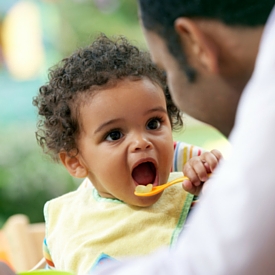
Harry Truman once said, “A nation is only as healthy as it’s children.” A growing health concern in the United States is the rapid rise in obesity. These conditions have risen to epidemic levels among all ages, including young children. One of the primary causes of overweight problems in children is poor eating habits.
Interestingly, babies begin acquiring eating habits from their first bites of food and studies have concluded that by 3 years old, most of a child’s eating preferences are established. The message here is clear – if you want your child to have healthy eating habits, it is important to focus on them early.
Developing eating habits and food preferences is a learned process, like sleeping through the night, potty training, and other developmental skills. In order for your child to learn, active involvement from parents and caregivers is required, and it will take time. Ensuring your child has the ability to make healthy food choices is critical, and parents should set aside the time and devote the energy to effectively teach your children these skills.
For babies, developing healthy eating habits does not mean dieting. Unless your baby’s diet is under the supervision of a health care provider, it is not necessary to count calories or choose low-fat or non-fat foods. Ensuring a healthy diet for babies is simply a matter of providing them with a good variety of healthy foods and limiting the consumption of most processed foods. Along with introducing your baby to a healthy diet, here are some tips and activities that will support developing healthy eating habits for your baby:
- Be a good role model . Babies learn through mimicking you and others around them. If you talk negatively about fruits and vegetables or don’t eat them much yourself, your baby will have a tough time accepting them. Remember, your baby will respond to what you like.
- Take your baby to the store or local farm stands. Begin introducing your baby to different fruits and vegetables. Teach him the names of different types of produce. Talk to him about the wonderful colors, great smells, and varied textures.
- Talk positively about vegetables and fruits . Let your baby know what he is eating when you are feeding him, what vitamins and minerals he is getting, and how important nutrients are for growing bigger and stronger.
- Encourage drinking water. Water aids in digestion, regulates body temperature, delivers nutrients to cells, and carries waste away. As your baby is introduced to solid food, the need for water is greater. Offer your baby 2-4 ounces of water at each meal. Get in the habit of offering water over juice.
- Don’t give up. Babies’ tastes change on a daily basis. Just because your baby spit out peas one day does not mean he doesn’t like them. Unless he has demonstrated an allergic reaction, try the food again in a couple days – you may be pleasantly surprised.
- Offer variety to ensure a balanced diet . All foods contain different vitamins, minerals, and nutrients. Eating a variety of healthy foods will naturally lead to a balanced diet. When your baby first starts eating, quantity is not as important as variety.
- Don’t be in a rush. Many babies are slow eaters, and this is a good habit to encourage. Many of us do not plan enough time to eat meals and often finding ourselves shoveling food in –- this is one of the worst eating habits that you can teach your baby. Instead, plan on of plenty of time for meals so you and your baby can relax and enjoy the experience.
- Have a feeding schedule. Baby’s have small tummies and fluctuating appetites, so 4-6 mini meals in each day are recommended over 3 large meals. Establishing set times for these meals will help your baby learn a routine.
- Never force babies to eat or finish all their food. Your baby will eat when he is hungry. And he will eat the types of food his body needs most. During meals allow him to eat as much or little as he wants.
- Make mealtimes a family event. Whenever it is practical, the whole family should eat together. This will encourage your baby to interact with others at mealtime and to begin experiencing a sense of social interaction.


